Netflix’s Limited ‘The Irishman’ Release Is a ‘Disgrace,’ Head of Movie Theater Group Says
President of the National Association of Theater Owners (NATO) John Fithian has called the short theatrical run of Netflix’s “The Irishman” a “disgrace.”
“It’s a very big disappointment that Netflix and the leading theater owners couldn’t figure out a way to put a significant movie from Martin Scorsese on a lot of screens,” Fithian told the New York Times. “This is a major director, a cinephile, who has made all kinds of important movies for our industry. And ‘The Irishman’ is going to play on one-tenth of the screens it should have played on, had Netflix been willing to come to an understanding with our members.”
NATO is a group that represents the interests of theater chains like AMC and Cineplex.
Also Read: NATO Chief: Movie Theaters and Streaming Services Can 'Coexist'
“Netflix is leaving significant money on the table,” Fithian added. “Think about ‘The Departed,’ in 2006. That Scorsese movie made $300 million globally. It garnered Scorsese the best director Oscar. It won best picture. It played for a long time in theaters and made a ton of money. Why wouldn’t Netflix want to monetize that before it went to Netflix? It can still be exclusive on Netflix. It can still draw subscribers. It would still be the only place you can see it at home.”
In a statement to TheWrap, Fithian added: “There was an opportunity here for Netflix to break new ground. In a rapidly changing competitive landscape, Netflix failed to recognize the advantage a full theatrical release for ‘The Irishman’ could give them with consumers and filmmakers. Their competitors won’t make that mistake.”
Netflix had no comment, however, Scott Stuber, Netflix’s head of original films, told the Times: “For ‘The Irishman,’ it was important for us to give it that theatrical run, to put it in big houses where people could congregate and have the opportunity to see it that way. But I also think people are going to love it just as much on Netflix.”
Also Read: 'The Irishman' Film Review: Martin Scorsese's Gangster Epic Is Melancholic and Bittersweet
The Martin Scorsese-directed drama is screening in only eight theaters this weekend in Los Angeles and New York before it will have a 26-day run in limited theaters. It starts streaming on Netflix on Nov. 27. Typically, major exhibitors insist on 72-day periods of exclusivity before films go on streaming platforms and home video.
According to the Times, representatives of two major theater chains agreed, independently, to lower that number to around 60 days. Netflix said it would not go over a 45-day exclusivity window. On Nov. 8, the movie will play in small movie theaters in the country’s top 10 markets, and it will then roll out to more theaters in the following weeks. Last year’s “Roma” had a 21-day exclusive release before it started streaming. Netflix then said the movie played on roughly 1,100 screens.
Scorsese’s movie had a budget of $160 million and was not a film that many studios wanted to take on due to the budget and the elaborate de-aging process required for the cast that consists of Al Pacino, Robert De Niro and Joe Pesci.
Also Read: The Luck of 'The Irishman': How One Man's Bookstore Visit Led to Producing the Martin Scorsese Hit (Guest Blog)
Earlier this week, the studio heads from the “Big Five” and Netfiix and Amazon took part in a roundtable discussion for The Hollywood Reporter and agreed that only Netflix could have produced “The Irishman.”
“It was very ambitious for a studio to take on a project like that. There is a different perception of the economics. For us, at that level, for a period drama — or for anyone, I would submit — it was ambitious. And it was perhaps too ambitious,” Paramount’s Jim Gianopulos said.
Warner Bros.’ Toby Emmerich added, “That’s where the consumer wins. I don’t think any of the studios could make that movie at that cost at that length and come out alive… The only difference for us, and maybe for the average consumer — I’ll bet everyone at this table wants to see ‘The Irishman’ in a theater.”
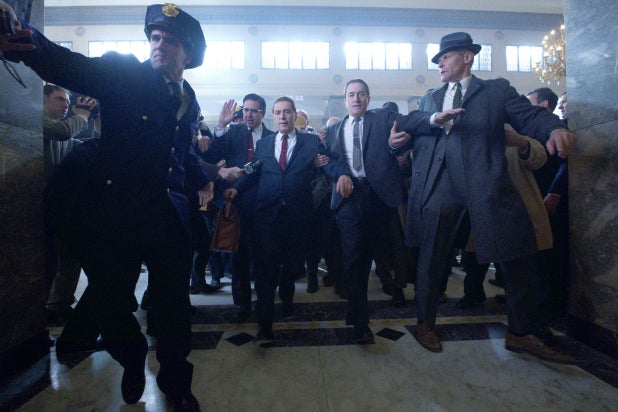
Martin Scorsese has made 25 narrative feature films, and only eight of them have been about people who live a criminal lifestyle. Yet when we think about his work, we think about the gangsters. Not Alice (who doesn’t live here anymore), not Christ (and his last temptation), but wise guys in slick suits who break the law, look good doing it, and always end up dead, miserable or both.
That’s probably because Scorsese, who grew up in New York City and knows the culture intimately, brings a specificity to his crime movies that matches his well-known virtuosity behind a camera. He may have made more films about other subjects than he has about criminals, but he helped define the way we look at criminality on screen. And he keeps coming back to the subject, again and again, to refine his techniques and to approach similar topics from all-new angles.
Let’s take a look at all the Scorsese movies that can confidently be called “crime” films, and see how they stack up against each other, which ones are truly essential:
Netflix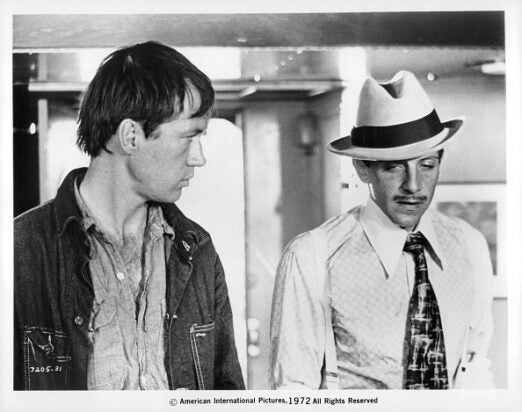
8. "Boxcar Bertha" (1972)
Martin Scorsese’s first crime movie -- and second feature -- stars Barbara Hershey as the eponymous young woman in the Great Depression whose boyfriend Big Bill (David Carradine) tries to start a railroad union. But when the law turns them into criminals, they decide to play the part for real and begin robbing the rich. Hershey is great, and so is Bernie Casey as their most dignified partner in crime, but the subtle character work and commentary about 1930s racism, sexism and economic disparity get lost in the lurid violence and sensuality that producer Roger Corman demanded of his exploitation cinema in the 1970s. “Boxcar Bertha” is at war with itself, and although Scorsese’s work was undeniably promising, it’s a war that nobody wins.
Photo by American International Pictures/Getty Images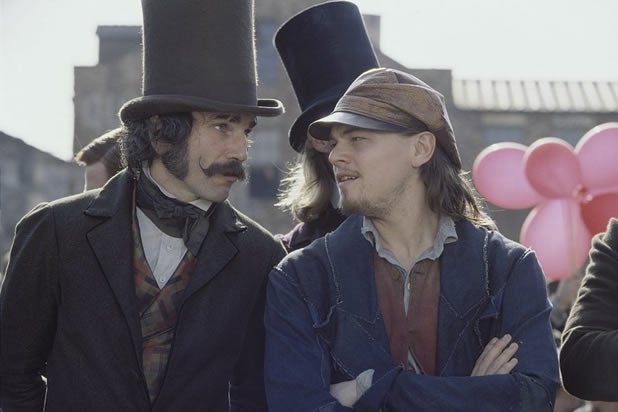
7. "Gangs of New York" (2002)
Arguably Scorsese’s most epic production, with elaborate sets that recreate mid-19th century New York City, “Gangs of New York” stars Leonardo DiCaprio as Amsterdam Vallon, a thief who sidles up to boisterous gangster Bill “The Butcher” Cutting (Daniel Day-Lewis), the man who killed Amsterdam’s father. Scorsese’s gigantic film is a masterpiece of period detail, from the sets to the costumes to the painstakingly recreated period-accurate accents. Unfortunately, the story gets lost in all the research; the film’s subplots are all more captivating than Amsterdam’s relationship with Bill, on which the entire movie supposedly hangs. Daniel Day-Lewis and most of the film’s supporting cast seem to fully inhabit this vibrant old world, with broad performances that could be straight out of a silent movie. In contrast, DiCaprio’s and co-star Cameron Diaz’s relatively contemporary acting styles make them look like they wandered in from another film.
Touchstone Pictures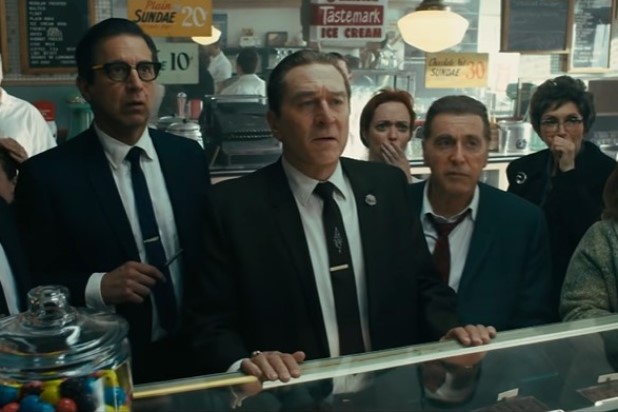
6. "The Irishman" (2019)
Scorsese’s biopic about Frank “The Irishman” Sheeran, the man who allegedly killed Jimmy Hoffa, is a panoramic gangster epic unlike any of his other panoramic gangster epics. Robert De Niro stars as Frank, who develops close relationships with mobster Russell Bufalino (Joe Pesci) and Hoffa (Al Pacino) over the course of many years, while short-changing his family and accomplishing nothing of consequence other than a body count. “The Irishman” goes right up to the point where all other gangster movies would end, then keeps going, as these powerful wise guys wither and die, giving Scorsese’s whole contribution to the gangster genre a fitting, thoughtful and melancholy denouement. But although the film is designed to play like the ramblings of an old man, it arguably does that job a little too well, and sometimes strains to justify its colossal running time.
Netflix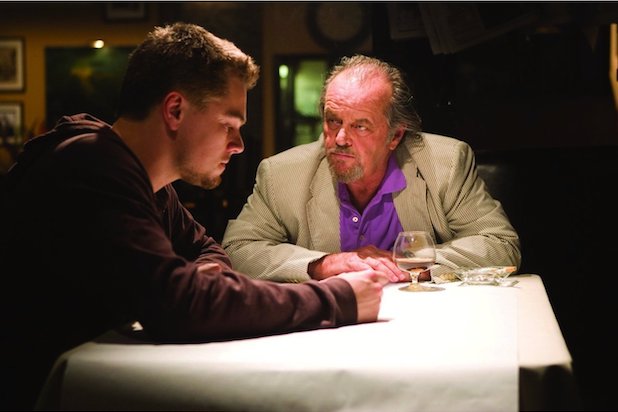
5. "The Departed" (2006)
Scorsese’s remake of Andrew Lau and Alan Mak’s sleek and stunning Hong Kong classic “Infernal Affairs” is huge and sloppy, but never less than riveting. Leonardo DiCaprio stars as Billy Costigan, a cop sent undercover with demonic Boston mobster Frank Costello, played by Jack Nicholson. What Costigan doesn’t realize is that Costello has his own sleeper agent, Colin Sullivan (Matt Damon), who’s infiltrated the task force that’s out to get Costello. The plot gets more complicated and fascinating when Costigan and Sullivan are assigned to root out the mole in both organizations, forcing them to chase after each other -- and themselves. Scorsese keeps the tricky storyline easy to follow, and Jack Nicholson gives an iconic performance, with Vera Farmiga, Alec Baldwin and Oscar-nominee Mark Wahlberg popping off the screen with memorable supporting turns. “The Departed” isn’t Scorsese’s richest gangster movie, but it may be his most thrilling.
Warner Bros.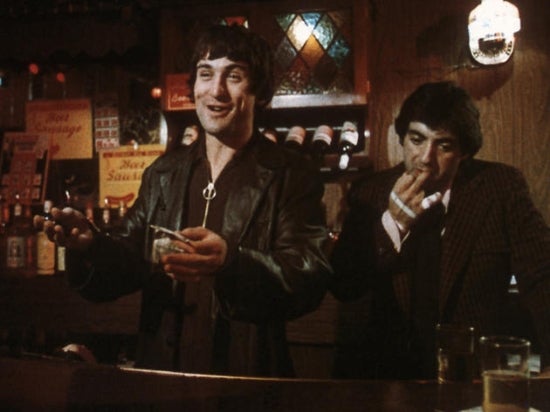
4. "Mean Streets" (1973)
Harvey Keitel and Robert De Niro have breakout roles in Scorsese’s first film about Italian-American gangsters, a free-flowing slice-of-life drama about low-level thugs balancing friendship, romance and minor scams in New York City in the 1960s. Keitel plays Charlie, a young mobster who struggles to balance the lifestyle he loves with his Catholic upbringing, opposite De Niro as Johnny Boy, the carefree firecracker who’s got debts all over town and an ever-growing list of enemies. Charlie tries to keep Johnny Boy out of trouble, but he may be powerless to prevent this coming-of-age tale from turning into a bitter tragedy. Scorsese's film is so dense with incidental detail that it doesn't feel like you're watching these moments; it feels like you fell into them, and the eclectic soundtrack and inventive camera work make even lazy evenings at the bar with the fellas pop like fireworks.
Warner Bros.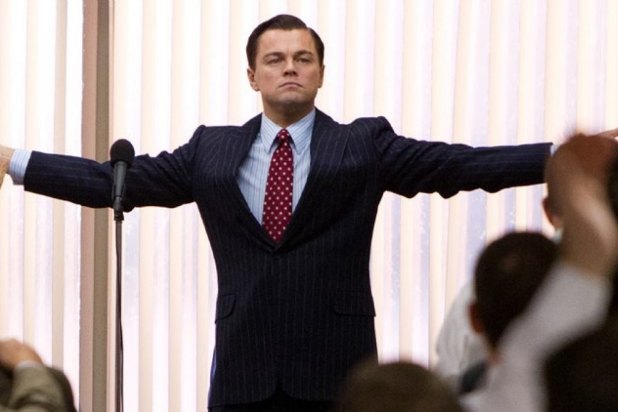
3. "The Wolf of Wall Street" (2013)
White-collar crime gets filmed with all the overwhelming zeal of a violent gangster epic in Scorsese’s hilarious and bitter biopic about stock-market con man Jordan Belfort. Leonardo DiCaprio gives a masterful and bizarrely physical performance as Belfort, who stole millions and millions and doesn’t get treated like a mobster because he never put a gun to anyone’s head, even though he obviously should. “The Wolf of Wall Street” is a wild and vicious condemnation of a system that rewards the despicable, while admitting, in no uncertain terms, the shiny appeal of Belfort’s road to moral dissolution. DiCaprio gives his finest, funniest and most intriguing performance as Belfort, while Margot Robbie dazzles in her breakout turn as his wife, Naomi.
Paramount Pictures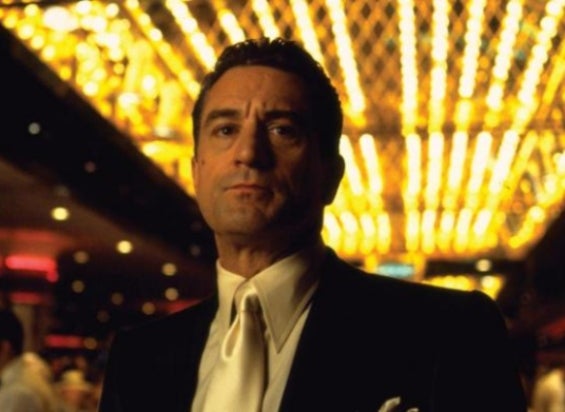
2. "Casino" (1995)
Scorsese’s exposé of the Las Vegas criminal underworld isn’t one of his typical morality tales: It’s discordant and intensified, and it never seems to take a breath (just like Vegas itself), and its storyline doesn’t so much come to an end as get suddenly beaten to death. Robert De Niro stars as “Ace” Rothstein, a gambling expert who’s given the reins of his own casino, the Tangiers, while his childhood friend Nicky Santoro (Joe Pesci) takes over the violent crime along the strip, and his wife Ginger (Sharon Stone) gradually dissolves into depression and drug abuse because Ace won’t let her go. “Casino” is excessive on every cinematic level, but Scorsese keeps it focused, employing dazzling imagery and stunning editing to convey the grotesqueries of Vegas with all of the majesty that cinema allows.
Universal Pictures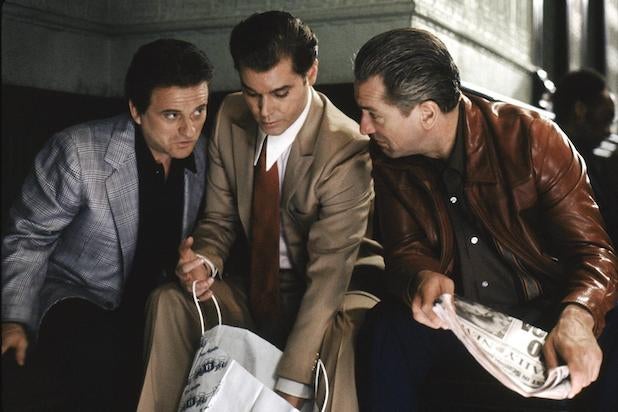
1. "Goodfellas" (1990)
As far back as Henry Hill can remember, he always wanted to be a gangster. Scorsese’s masterpiece follows young Hill from his early days as a street hustler to the inner mafia circles, into absolute desperation and decay, and onward into limbo. As Hill, Ray Liotta captures the slickness and the slime of criminal excess, while Joe Pesci’s hair-trigger temper offers a constant reminder that every single moment of this seemingly appealing lifestyle could lead directly to your own murder, only seconds later. Captivating cinematography (by Michael Ballhaus) captures the glitz, while the film expands and contracts to show how fleeting success can be, and how interminable your last day as a free man feels. Revealing, earnest, beautiful and cruel, “Goodfellas” is the ultimate Scorsese experience.
Warner Bros.
Where does “The Irishman” stand in his bad-guys-doing-bad-things oeuvre?
Martin Scorsese has made 25 narrative feature films, and only eight of them have been about people who live a criminal lifestyle. Yet when we think about his work, we think about the gangsters. Not Alice (who doesn’t live here anymore), not Christ (and his last temptation), but wise guys in slick suits who break the law, look good doing it, and always end up dead, miserable or both.
That’s probably because Scorsese, who grew up in New York City and knows the culture intimately, brings a specificity to his crime movies that matches his well-known virtuosity behind a camera. He may have made more films about other subjects than he has about criminals, but he helped define the way we look at criminality on screen. And he keeps coming back to the subject, again and again, to refine his techniques and to approach similar topics from all-new angles.
Let’s take a look at all the Scorsese movies that can confidently be called “crime” films, and see how they stack up against each other, which ones are truly essential:







